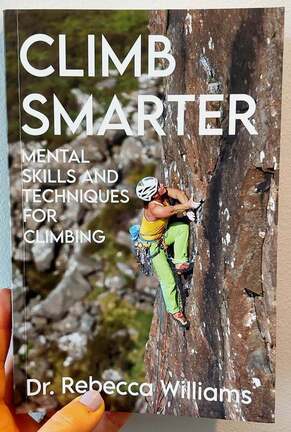
I was really excited to read this; I listened to Rebecca’s seminar for the Women’s Climbing Symposium during lockdown and found it incredibly useful, so I was looking forward to more of her advice. Climb Smarter hasn’t disappointed at all. Rebecca’s clear breadth of experience and knowledge make this an invaluable resource for anyone who feels they can improve their mental approach to climbing (presumably nearly everyone?!).
This review comes with the slight caveat that I had to read through the book quickly in order to write a review; in an ideal world I would have worked through it at a much slower pace, as suggested, allowing plenty of time to absorb the information and work through the recommended exercises. But even on a speedy read through, I’ve picked up plenty of tips and strategies which have already helped improve my mental approach to climbing. I’ve already found myself trying harder on routes and better able to manage my headgame.
It's a really approachable guide. Rebecca breaks mental training down into small, specific areas (things like staying calm under pressure, motivation, constructive self-talk, ability to focus, learning from mistakes in a positive way… far too many to list here!) and suggests tackling each one individually, which makes the whole thing feel much more manageable. Some case studies from climbers she’s previously worked with give good examples of how to apply the strategies, and it’s reassuring to read how much other climbers have been able to improve their mindset. I appreciated the understanding that climbing training isn’t always a constant – sometimes life gets in the way, sometimes motivation fluctuates, sometimes you get ill – which helps this feel like a very human and realistic approach to training. I really felt right from the start that this offered training advice that I’d actually be able to fit in around the other busyness in life. There’s also an interesting discussion of how to balance your personal values with your climbing values, and the potential problems raised if these are in conflict with each other. I hadn’t considered this angle before, and it’s definitely a useful train of thought to wander down. I really can’t recommend this enough for anyone keen to improve their climbing headgame, particularly if mental training has always felt a bit daunting and you’re not sure where to start with it. I’m looking forward to going back through it at a much slower pace now, working through some of the exercises and coming up with a mental training plan to help me move forward. (With thanks to Sequoia Books for a free copy in exchange for an honest review.)
0 Comments
Leave a Reply. |
book REVIEWSPredominantly climbing/outdoors literature, mountaineering history and nature writing. Archives
July 2023
Categories
All
|
 RSS Feed
RSS Feed


